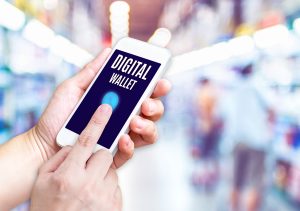If you bought a smartphone in the last year or two, you may have noticed that it touted digital wallet technology. If so, you probably wondered why you would switch from whatever system is working for you now. Digital wallets are catching on more slowly than expected, but you can expect to see and hear more about them in the next few years. They claim to offer convenience and added security. But should you take the plunge?

What Is a Digital Wallet?
Although the term “digital wallet” technically has a broad meaning, these days it almost always refers to the storage of payment credentials on your phone for use at brick-and-mortar stores, as well as for internet purchases. Near field communication technology, or NFC, allows you to simply hold your phone near a payment terminal, authenticate the purchase and be on your way.
Digital wallets keep all your cards in one place. Some of them also keep your various loyalty, rewards and coupons in one place — and pull up the right ones just as you need them.
The Late Bloomer
Unlike smartphones and MP3 players, technologies that the public quickly embraced, digital wallets haven’t gained much traction yet. The key reason? A self-perpetuating cycle: point-of-sale (POS) terminals with the required NFC technology were expensive to upgrade to and in low demand from consumers, so only a few retailers actually accepted digital wallets. And because using digital wallets as a payment method wasn’t widely accepted, few consumers bothered to set it up, keeping demand for the technology low.
Enter a possible game-changer. Credit card companies set October 2015 as a deadline for retailers to upgrade their POS terminals to models that include chip readers. Since that date, any retailer without chip-reader compliance will be held liable for fraudulent transactions. This has created a huge incentive for retailers to upgrade their terminals, and many are upgrading with models that include NFC technology. In another year or two, it could be pervasive.
Security Concerns
A consensus among tech and security bloggers is beginning to develop that digital wallets are safer than credit cards. If you lose your credit card or hand it to an unscrupulous clerk, your credit card number is as good as compromised. Digital wallets store your information behind multiple layers of security, including encryption, your fingerprint and a complex process called tokenization. Tokenization prevents your actual card number from being skimmed by a third party by utilizing dummy numbers. So, even if your phone is lost or stolen, it will be very difficult for anyone to access your personal information.
There is one major security caveat. Some, but not all, financial institutions transfer individual responsibility of fraud to their customers if they choose to use a digital wallet.
Should you make the switch? First, check with your credit union, bank or credit card company to see if you’ll still be protected from fraud if you use a digital wallet. If that’s the case, it may be worth a try. Unfortunately, NFC isn’t ubiquitous yet, so you’ll still have to carry cards for occasions when you visit retailers that haven’t upgraded yet. Nevertheless, you can take pride knowing you’re leading the technological tide!
Original Source: http://palisades.frc.finresourcecenter.com/Consumer_Resources_148443.html?article_id=2191


